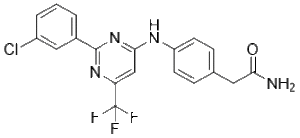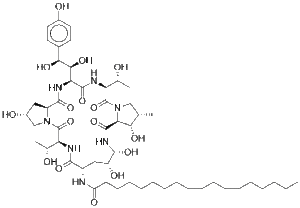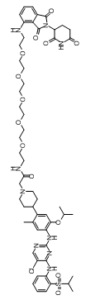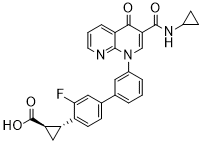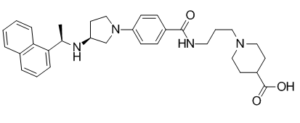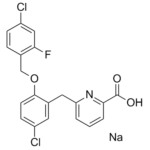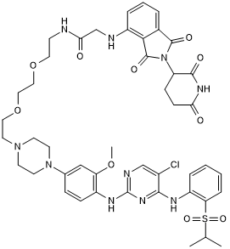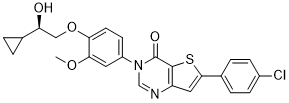BPN14770 is a novel and potent allosteric modulator of phosphodiesterase-4 (PDE4) with IC50 values of 8 and 130 nM for human and mouse PDE4D, respectively. It may help reverse scopolamine-induced cognitive impairment. Inhibitors of phosphodiesterase-4 (PDE4) have beneficial effects on memory in preclinical and clinical studies. Development of these drugs has stalled due to dose-limiting […]
Echinocandin B is a novel and potent cyclic hexapeptide echinocandin antibiotic originally isolated from Aspergillus nidulans var. echinulatus with specific anti-yeast activity. It inhibits beta-1,3-glucan synthesis and thus attacks the cell wall of fungi. Echinocandin B is an inhibitor of 1,3-β glucan synthase, and it inhibits incorporation of radiolabeled glucose into alkali-insoluble glucan by S. […]
MS4077 is a potent PROTAC degrader of anaplastic lymphoma kinase (ALK) with a Kd of 37 nM for binding affinity to ALK. MS4077 and MS4078 potently decreased cellular levels of oncogenic active ALK fusion proteins in a concentration- and time-dependent manner in SU-DHL-1 lymphoma and NCI-H2228 lung cancer cells. The ALK protein degradation induced by compounds […]
MK-0952 is a novel, potent and selective PDE4 inhibitor with the potential for the treatment of long-term memory loss and mild cognitive impairment. It is an intrinsically potent inhibitor displaying limited whole blood activity. Phosphodiesterase inhibitors are used as a target for cognition enhancement in aging and Alzheimer’s disease.
GSK3004774 is a novel, potent, nonabsorbable agonist of CaSR, with an pEC50 of 7.3, 6.6 and 6.5 for human, mouse and rat CaSR, respectively. GSK3004774 shows an EC50 of 50 nM for human CaSR. Modulation of gastrointestinal nutrient sensing pathways provides a promising a new approach for the treatment of metabolic diseases including diabetes and […]
GSK-269984A is a novel and potent Prostaglandin E2 Receptor 1 (EP1) antagonist with a pIC50 of 7.9. GSK269984A was designed to overcome development issues encountered with previous EP(1) antagonists such as GW848687X and was found to display excellent activity in preclinical models of inflammatory pain. However, upon cross species pharmacokinetic profiling, GSK269984A was predicted to […]
TL13-12 is novel, potent and selective PROTAC degrader of anaplastic lymphoma kinase (ALK) with potential anticancer activity. It degrades ALK with DC50 values of 10 and 180 nM in H3122 and Karpas 299 cells, respectively. It comprises the cereblon E3 ligase ligand Pomalidomide conjugated to an ALK inhibitor. TL13-12 is the first small molecule degraders […]
Foretinib-Based PROTAC 7 is a novel, potent and selective VHL-recruiting PROTAC that induces the degradation of c-Met in a dose- and time-dependent fashion in MDA-MB-231 cells. Proteolysis targeting chimera (PROTAC) technology has emerged over the last two decades as a powerful tool for targeted degradation of endogenous proteins. Herein we describe the development of PROTACs […]
BMS-819881 is a novel and potent antagonist of MCHR1 (Melanin concentrating hormone receptor 1) with minimal hERG activity. It binds to rat MCHR1 with a Ki of 7 nM and is also selective for CYP3A4 activity with an EC50 of 13 μM. BMS-819881 has the potential to be used as an anti-obesity drug. It is […]
dBRD9 (dBRD-9) is a novel and potent PROTAC degrader of the BRD9 bromodomain and the cereblon E3 ubiquitin ligase complex with anticancer activity. The bromodomain-containing protein BRD9, a subunit of the human BAF (SWI/SNF) nucleosome remodeling complex, has emerged as an attractive therapeutic target in cancer. Despite the development of chemical probes targeting the BRD9 […]
